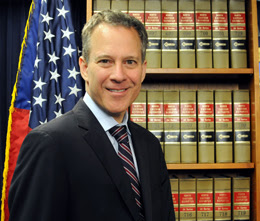STAFF REPORTS
news@allwnynews.com

Standing along the Gowanus Canal, which is a designated federal Superfund site, Attorney General Schneiderman highlighted how the significant loss of EPA funding and reduction in the agency’s staffing levels would potentially slow, halt, or even reverse environmental protection throughout the state. Under President Trump’s proposed budget “blueprint” released last Thursday, the EPA would face some of the steepest cuts, as funding for the agency would be reduced by 31 percent or $2.6 billion – bringing the EPA’s budget to $5.7 billion, its lowest level in 40 years when adjusted for inflation, and eliminating more than 50 programs and 3,200 jobs.
“President Trump’s proposed budget cuts would have a devastating impact on New York – delaying and obstructing environmental projects around the state,” said Attorney General Schneiderman. “Decades of hard work have helped clean up New York’s air, water, and environment. But President Trump’s budget threatens to unravel those gains and send us back to the bad old days of choking smog and rampant pollution. As we’ve made clear: if the Trump administration won’t meet its legal obligations to ensure basic access to a clean, safe, and healthy environment, we won’t hesitate to act to protect New Yorkers.”
President Trump’s proposed EPA budget cuts include:
- A 45% cut in Categorical Grants to states that help develop and implement various water, air, waste, pesticides, and toxic substances programs.
- A 50% reduction in the EPA’s Office of Research and Development.
- The total elimination of the $427 million funding of the Great Lakes Restoration Initiative and other geographic programs.
- The total elimination of funding for the Clean Power Plan, international climate change programs, climate change research and partnership programs, and “related efforts,” totaling $100 million
- A 30% reduction in Superfund site cleanup funding.
- A 30% decrease in the EPA’s enforcement and compliance budget.
- The total elimination of funding for 50 EPA programs totaling $347 million, including Energy Star, a voluntary labeling program, created in 1992, designed to identify energy-efficient, cost-saving home appliances, lighting, and electronics for consumers.
The proposed 43 percent cut in Superfund site cleanup funding could potentially translate to a reduction in staffing and administrative funding – and undermine the agency’s ability to perform vital oversight and management of cleanups – potentially slowing or even halting the vital progress made at the 85 federal Superfund sites across New York State. These sites include the Gowanus Canal in Brooklyn; Newtown Creek in Queens/Brooklyn; the former Wolff-Alport Chemical Company in Ridgewood, Queens; New Cassell/Hicksville groundwater contamination site in Nassau County and Dewey Loeffel landfill in Rensselaer County; Wappinger Creek in Dutchess County; Black River PCBs site in Jefferson County, Eighteen Mile Creek in Niagara County; and many others.
In September 2016, EPA officially proposed to add the Saint-Gobain Performance Plastics Site in Hoosick Falls to the Superfund list. Groundwater at the Saint-Gobain Performance Plastics facility, located at 14 McCaffrey Street, is contaminated with Perfluorooctanoic Acid (PFOA). The proposed blueprint budget cuts may mean that EPA will not designate Hoosick Falls as federal Superfund site. If Hoosick Falls is declared a Superfund site, significant questions remain whether it will have the staff and resources necessary to effectively and timely address this critical public health threat.
The budget also flat-funds state drinking water and wastewater grants; yet over the next 15 years, New York will need $39 billion to maintain its drinking water infrastructure and over $35 billion to maintain its wastewater treatment infrastructure. Nearly 95% of all New Yorkers receive water from public water supply systems, and over 1,600 municipalities are served by wastewater treatment facilities. Without essential funding, municipalities will be hard-strapped to finance and ensure the safety of their drinking water supplies – potentially jeopardizing the health of millions of New Yorkers.
Additionally, President Trump’s budget wholly eliminates funding for the Great Lakes Restoration Initiative, which is one of the most widely supported, bipartisan, and successful pieces of legislation in Great Lakes history. The Great Lakes Restoration Initiative has been critical in improving and protecting the health of these bodies of water, which support over 150,000 local jobs and have spurred millions in other investments.
Finally, the proposed budget makes dramatic cuts to climate change programs and research, which imperils not just water quality and infrastructure but the air quality and overall health, safety, and welfare of all New Yorkers and Americans. In 2011, Hurricane Irene in 2011 dumped more than 11 inches of rain on the Hudson Valley, eastern Adirondacks, Catskills, and Champlain Valley in just 24 hours, causing 31 counties to be declared disaster areas. Furthermore, an analysis found that the warming of the ocean and the higher sea level expanded the flooding of Superstorm Sandy by about 25 square miles and flooded the homes of an additional 80,000 people in New York and New Jersey.
Earlier this month, Attorney General Schneiderman sent a letter to Office of Management and Budget Director Mick Mulvaney and EPA Administrator Scott Pruitt, highlighting the impact of reported EPA budget cuts.
Attorney General Schneiderman has also led coalitions of attorneys general in opposing the Trump administration’s environmental rollbacks, including fighting back against the administration’s weakening of vehicle emission standards; opposing President Trump’s Executive Order that seeks to eliminate the Clean Water Rule; and supporting the Clean Power Plan against efforts to discard the plan.
All WNY is made possible thanks to coffee and sleep deprivation.
We appreciate your readership. We like money, too.

